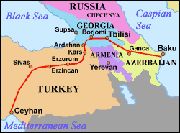Entered into the database on Thursday, October 13th, 2005 @ 17:38:06 MST
History may judge it as one of the capital moves of the 21st century's
New Great Game: May 25, the day high-quality Caspian light crude started flowing
through the Caucasus toward the Mediterranean in Turkey. The Baku-Tbilisi-Ceyhan
pipeline (BTC) - conceived by the US as the ultimate Western escape route from
dependence on oil from the Persian Gulf - is finally in business. This is what Pipelineistan is all about: a supreme law unto itself - untouchable
by national sovereignty, serious environmental concerns (expressed both in the
Caucasus and in Europe), labor legislation, protests against the World Bank, not
to mention mountains 2,700 meters high and 1,500 small rivers. BTC took 10 years
of hard work and at least US$4 billion - $3 billion of which is in bank loans.
BTC is not merely a pipeline: it is a sovereign state. This BTC state slices Azerbaijan in half from east to west, then slices Georgia
in half almost from east to west, before taking a dip south, bypassing secessionist
Ajaria and slicing Turkish Anatolia diagonally from the northeast toward the south.
The founding stone is at British Petroleum's (BP's) gleaming terminal at Sangachal,
half an hour along the Caspian south of Baku. The state is 44 meters wide, snaking
1,767 kilometers across three countries, two of those (Azerbaijan and Georgia)
extremely volatile, and the other (Turkey) faces potential trouble from dispossessed
Kurds. The pipeline itself is only 126 centimeters wide, a dizzying steel serpent of
no less than 150,000 segments made in Japan, finished in Malaysia and delivered
by ship to the Georgian port of Batumi, capital of the separatist micro-republic
of Adjaria - which is virtually uncontrolled by Tbilisi. To understand the scope and ambition of BTC, one must visit Villa Petrolea, the
Baku headquarters of BP. The BTC's major shareholders are BP (30.1%) and the Azerbaijani
state oil company SOCAR (25%), followed by Unocal (US, 8.9%), Statoil (Norway,
8.71%), Turkish Petroleum (6.53%), ENI (Italy, 5%), TotalFinaElf (France, 5%),
Itochu (Japan, 3.4%), ConocoPhillips (US, 2.5%), Inpex (Japan, 2.5%) and Delta
Hess (a joint venture of Saudi Delta Oil with American Amerada, 2.36%). BP has invested at least $15 billion in the country (exploration, exploitation,
pipeline construction). According to Baku's street wisdom, the man who really
rules Azerbaijan is David Woodward, BP's chairman, known as "the viceroy",
a walking oil atlas with more than three decades working for the company from
Scotland to Abu Dhabi and from Alaska to Siberia. Woodward and BP mercilessly
spin that BTC is the cleanest and safest pipeline ever built. Georgian peasants
and English non-governmental organizations beg to differ. Dynasty, Caucasus-style BTC would be impossible without the usual, strategically positioned US-supported
dictator - in this case old, ruthless Caucasus hand Heydar Aliyev, who died
in December 2003. A dynastic dictatorship is even better, since his son Ilham
became the successor in fraudulent elections in October 2003. It also helped
that Ilham, a former playboy, happened to be the head of the state oil company,
SOCAR. Azerbaijan was never about "liberty and democracy" or color-coded
revolutions in the style of Georgia, Ukraine and Kyrgyzstan. In Georgia the obstacles were more complex than in Azerbaijan. Thus the "Rose
Revolution" of late 2003, getting rid of Edward Shevardnadze to the benefit
of young, photogenic, American-educated and American-aligned Mikhail Saakashvili.
The small matter of defending BTC from attacks of alleged al-Qaeda-related Chechens
holed up in the Georgian mountains remains. But at least protection at the end
of BTC in Ceyhan in Turkey is guaranteed: it's not a coincidence that the pipeline
ends right next door to the massive American airbase at Incirlik. Game not over Everything related to BTC spells tremendous ambition. It will take a few months
to fill the pipeline - and for the supertankers at Ceyhan to be loaded with
Caspian crude, thus bypassing the highly congested Bosphorus. BTC is projected
to reach 1 million barrels a day - roughly 1.2% of global production. Compare
it with the 500,000 barrels of the Caspian Pipeline Consortium, which moves
crude from Baku to the Russian port of Novorossiysk. BTC makes little sense in economic terms. Oil experts know that the most cost-effective
routes from the Caspian would be south through Iran or north through Russia.
But BTC is a designer masterpiece of power politics - from the point of view
of Washington and its corporate allies. US Vice President Dick Cheney, already
in his previous incarnation as Halliburton chief, has always been a huge cheerleader
for the "strategically significant" BTC. The verdict is open on whether
this massive investment will be worth it. Instead of the dreams of a new Kuwait,
the Caspian may hold only 32 billion barrels of oil - not much more than the
reserves of Qatar, a small Gulf producer. The Caspian in fact may hold less
than 10% of the total, known Middle East reserves. Anyway, what really matters is positioning in the New Great Game. The Caucasus,
the Caspian and Central Asia are up for grabs. European customers for Azeri
(and Kazakh) oil and gas might rely on BTC for some of their supply. But the
Russian counterpunch will come: President Vladimir Putin will not cease to seduce
the European Union with loads of Russian, Caspian oil - plus strong protection
- in return for loads of European Union investment. Ladies and gentlemen, place
your bets.
